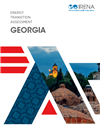

-
-
IRENA (2025), Energy transition assessment: Georgia, International Renewable Energy Agency, Abu Dhabi.
Copied
https://www.irena.org/-/media/Files/IRENA/Agency/Publication/2025/Apr/IRENA_COU_ETA_Georgia_2025.pdf
Copied
Energy transition assessment: Georgia
Newsletter
Georgia has abundant hydropower and biomass potential; however, these resources meet less than a quarter of the country’s total primary energy supply, with a falling share over the past decade. Together with seasonal variations in hydropower production, this decline has contributed to increasing reliance on energy imports. Yet Georgia has significant wind, solar and geothermal energy potential, offering a sustainable pathway for energy sector development.
This energy transition assessment, developed by the International Renewable Energy Agency (IRENA) in close cooperation with the Ministry of Economy and Sustainable Development (MoESD), aims to support Georgia in its efforts to integrate a higher share of renewable energy, increase its energy security and better align its energy and climate ambitions.
The report aims to inform the development of Georgia’s forthcoming revised Nationally Determined Contribution to the Paris Agreement (NDC 3.0). It calls for the establishment of an implementing body for the energy transition, in addition to measures to empower municipalities to take an active role in energy sector development, and provides recommendations in key action areas including: governance; the integration of renewable power; the decarbonisation of end-uses; energy transition financing; local value creation and capacity building; and achieving a just and equitable transition.




